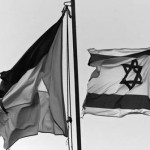Tuesday
Aug312010
Israel: A Rabbi's War on Palestinians (Yenidunya)
 Tuesday, August 31, 2010 at 9:20
Tuesday, August 31, 2010 at 9:20  Last week, the leader of Israel's Shas ultra-orthodox religious party reiterated his position that there should be no extension of moratorium on settlement construction when it ends on 26 September.
Last week, the leader of Israel's Shas ultra-orthodox religious party reiterated his position that there should be no extension of moratorium on settlement construction when it ends on 26 September.Rabbi Ovadia Yosef's provocative words fell like a bombshell on Sunday. Army Radio reported that Yosef calling for Palestinian Authority leader Mahmoud Abbas to "perish from this world". Yosef said Palestinians were "evil, bitter enemies of Israel":
Gaza Latest: Cairo Intercepts Missiles, Mossad’s Flotilla Testimony, and Hamas on Direct Talks
God should strike them with a plague, them and these Palestinians. It is forbidden to be merciful to them. You must send missiles to them and annihilate them. They are evil and damnable.
Chief Palestinian negotiator Saeb Erekat denounced Yosef's remarks and claimed these statements advocated genocide of Palestinians. Erekat criticised West Jerusalem's silence:
Is this how the Israeli government prepares its public for a peace agreement? It is an insult to all our efforts to advance the negotiations process.
On the same day, U.S. State Department spokesman Philip J. Crowley commented:
We regret and condemn the inflammatory statements by Rabbi Ovadia Yosef. These remarks are not only deeply offensive, but incitement such as this hurts the cause of peace.
As we move forward to relaunch peace negotiations, it is important that actions by people on all sides help to advance our effort, not hinder it.




